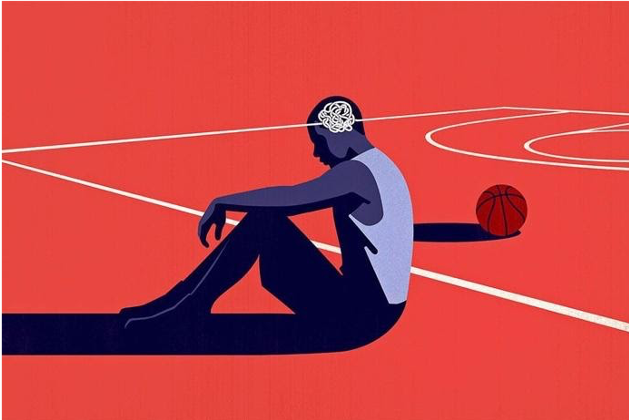Let’s start with the obvious: When we engage in sporting activities, or exercise, we do so in the hope of improving, progressing or at least maintaining a desired level of physical fitness and health. It’s easy to track your progress; you can see the improvements, you can feel the increase in fitness levels and often others around you can too. But there is also an invisible development that goes hand in hand with the physical gains. It’s one that is often overlooked, or barely considered, but if anything may actually be more beneficial to your general lifestyle – Your mental health. Let’s be honest here we’ll happily devise plans or arrange sessions to focus on increasing muscle strength, tone, VO2 Max, speed, endurance, flexibility and agility but what about the most important organ of all – your brain.
Well, here’s the thing, whilst you may not be actively considering how you can “train” your brain to be a healthier functioning organ, simply just by engaging in regular exercise the benefits to your brain, and overall mental health, are unrivalled by many other lifestyle choices, pursuits or hobbies.
The Stats
Now, the numbers may be unquantifiable to a certain degree thanks to the nature of attempting to measure the invisibly immeasurable. However, you just can’t argue with the scientific research that has gone into producing some tangible results in this area. Studies have shown that for those engaging in daily exercise routines there is between 20-30% lower risk of depression or general feelings of distress. Running for just 15-minutes a day or walking for one hour can reduce the risk of depression by as much as 26%.
How does physical exercise improve mental health?
We’ve all heard of the “Runner’s High” but it’s not actually limited to those that are purely runners. The term actually refers to the chemical process that takes place during exercise and the release of endorphins, commonly known as the “feel-good hormone”. There are a number of chemicals released when triggered by physical exercise, each one benefiting our physical and mental capacity as a result:
- Dopamine
- Norepinephrine
- Serotonin
- Adrenaline
Each one plays a key role and offers something different to the last. Adrenaline and Norepinephrine both work closely together to increase energy levels and improve attentiveness; Dopamine contributes towards feelings of motivation and happiness; Serotonin increases feelings of optimism, satisfaction as well as happiness. Most interestingly, Serotonin is actually the chemical that modern day anti-depressant drugs are intended to target to improve a person’s mood and general feelings of mental well-being, and here we are increasing levels of our own natural anti-depressant simply by getting up and exercising.
Further Benefits of Sport on Mental Health
It’s not all about the chemicals and the internal wonders of our bodies that can improve our mental health during exercise. There are a number of external factors associated with sport and exercise that contribute towards improving our overall mental well-being
- Social Gatherings
The social element to sport and exercise is quite often high on the list for those taking part. It can be too easy to feel isolated when suffering from anxiety or depression and being part of a sports team, a club or joining a class, is a fantastic way to facilitate interaction with others, often of a similar mind-set with shared interests.
- The Art of Distraction
Regular exercise and sport can provide a well-timed and welcome distraction from other parts of life that might be tricky to deal with from time to time. It can be time spent away from negative thoughts or alternatively provide you additional time and space to work out any issues.
- Tension and Stress Busting
Sport is often seen as a great way to release tension and stress, physical and mental. Exercise can provide the ideal outlet to channel feelings of anger and frustration down more beneficial and productive routes. The feelings of stress and frustration will often subside with the release of endorphins but alongside that some emotions associated with these feelings, which can be a detriment to certain areas of life, can be released and alleviated by simple physical exercise.
- The Self-Esteem Dream
Exercise and sport are the ideal boost for anyone’s self-esteem. The feeling alone of tackling, overcoming and succeeding in a challenge will do your self-esteem no end of good. Knowing that you are capable of more than you might have thought originally is a sure fire to increase positive self-affirmation. Likewise, the overarching benefit of regular exercise is the impact on one’s physical health and if you can improve upon that then the higher self-esteem will always quickly follow.
How Much Exercise Should You Be Doing
It’s one we’ve all wondered at one time or another and it’s natural to be inquisitive – how much will I have to put in to reap the rewards. In a world that is so fast paced, and with busy lives, it can be a daunting and sometimes tiring prospect of having to set aside time specifically to exercise, with many of us reluctant to do so at all. Recommendations from the NHS suggest adults should try to aim for 150-Minutes per week of moderate exercise or alternatively 75-minutes per week of vigorous exercise; and for context, this guideline considers exercise to be anything from Walking to weightlifting or swimming to squash and everything in between. The key to experiencing the full benefit of what sport and exercise can offer your mental health is not to be fixated on how much but to try to exercise regularly and consistently as part of a varied and active lifestyle









